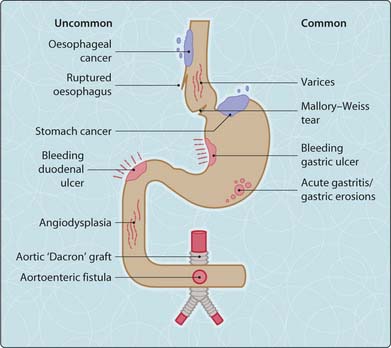| Name | Upper Gastrointestinal Tract Bleeding |

Upper Gastrointestinal Tract Bleeding
Upper Gastrointestinal Tract Bleeding is referred to bleeding that occurs anywhere in the esophagus, the stomach, or the upper part of the small intestine. It is a symptom of an underlying disorder, and it can be serious.
It can be acute or chronic. Acute bleeds are sudden and severe, while chronic bleeding lasts for a longer period and is typically less obvious. Both can cause serious health complications if a person does not receive treatment.
Signs and Symptoms
The following could be included as signs and symptoms
- black, tarry stool
- vomit that is bright red or resembles coffee grounds
- stomach cramps
- unusually pale skin
- feeling faint, dizzy, or tired
- weakness

Many different factors contribute to the conditions that may cause GI bleeds.
For example, GERD is more common in those who smoke, are pregnant, or have obesity. Some medications can also exacerbate it, such as:
- NSAIDs
- calcium channel blockers
- benzodiazepines
- tricyclic antidepressants
If a medication could be worsening ulcers or bleeding, a person should speak with a doctor about alternatives or changes to the dosage. However, it is important never to change the dosage without consulting a medical professional.
A doctor can help someone understand the root cause of a GI bleed and how to treat or manage it. This approach is usually the best way to prevent further bleeds.
People with a history of GI bleeds or ulcers can lower their risk of GI bleeding by:
- avoiding alcohol
- stopping smoking, if a smoker, or avoiding secondhand smoke
- limiting or stopping the use of NSAIDs
People with GERD may also find that certain dietary changes help alleviate their symptoms by reducing irritation and inflammation. People can try avoiding:
- caffeine
- minty, spicy, or acidic foods
- high-fat foods
Sudden and severe GI bleeding is a medical emergency, but slower, chronic bleeding can also become serious over time. Anyone who suspects that they have a GI bleed should see a doctor right away.
Doctors can stop or control upper GI bleeding with medications or use heat or surgery to seal wounds. Treating the underlying condition can then prevent further bleeding.
 Bangla
Bangla English
English